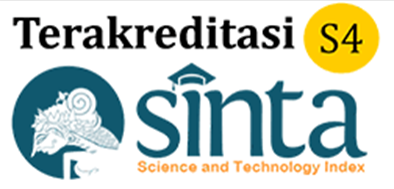Pengembangan Pariwisata Berkelanjutan di Pantai Padang: Ditinjau dari Efektivitas Pengembangan Fasilitas dan Infrastruktur
Abstract
This research is motivated by sustainable tourism and its relevance to the development of facilities and infrastructure on Padang Beach. Preliminary data shows an increase in the number of tourist visits to Padang Beach, indicating continued increasing interest in this destination. This article aims to analyze the effectiveness of the facilities and infrastructure development program at Padang Beach in achieving sustainable tourism goals. This research uses a descriptive qualitative approach involving 14 informants in May 2023. The research results reveal that several challenges still need to be overcome in developing sustainable tourism on Padang Beach. Improving service quality is still not optimal; there needs to be more local community involvement, as well as infrastructure challenges such as inadequate public transportation, inadequate parking, and a lack of public facilities such as toilets. Environmental management must also be improved to reduce negative impacts on coastal and aquatic ecosystems. Based on the results and discussion, this article concludes that further efforts must be made to enhance the quality of service, involve local communities in tourism development, overcome infrastructure challenges, and improve the environmental management at Padang Beach. This research is hoped better to understand the effectiveness of facilities and infrastructure development programs and provide input for policies and practices for sustainable tourism development in other destinations.
References
Alamineh, G. A., Hussein, J. W., Endaweke, Y., & Taddesse, B. (2023). The local communities’ perceptions on the social impact of tourism and its implication for sustainable development in Amhara regional state. Heliyon, 9(6), e17088. https://doi.org/10.1016/j.heliyon.2023.e17088
Angelevska-Najdeska, K., & Rakicevik, G. (2012). Planning of Sustainable Tourism Development. Procedia - Social and Behavioral Sciences, 44, 210–220. https://doi.org/10.1016/j.sbspro.2012.05.022
Bowan, D., & Dallam, G. (2020). Building bridges: overview of an international sustainable tourism education model. Journal of Teaching in Travel and Tourism, 20(3), 202–215. https://doi.org/10.1080/15313220.2020.1797609
Cárdenas, D. A., Byrd, E. T., & Duffy, L. N. (2015). An exploratory study of community awareness of impacts and agreement to sustainable tourism development principles. Tourism and Hospitality Research, 15(4), 254–266. https://doi.org/10.1177/1467358415580359
Carter, R. W. (Bill., Thok, S., O’Rourke, V., & Pearce, T. (2015). Sustainable tourism and its use as a development strategy in Cambodia: a systematic literature review. Journal of Sustainable Tourism, 23(5), 797–818. https://doi.org/10.1080/09669582.2014.978787
Chiu, Y. T. H., Lee, W. I., & Chen, T. H. (2014). Environmentally Responsible Behavior in Ecotourism: Exploring the Role of Destination Image and Value Perception. Asia Pacific Journal of Tourism Research, 19(8), 876–889. https://doi.org/10.1080/10941665.2013.818048
Diallo, M. F., Diop-Sall, F., Leroux, E., & Vachon, M. A. (2022). How do tourism sustainability and nature affinity affect social engagement propensity? The central roles of nature conservation attitude and personal tourist experience. Ecological Economics, 200(June 2021), 107503. https://doi.org/10.1016/j.ecolecon.2022.107503
Dogru, T., Bulut, U., Kocak, E., Isik, C., Suess, C., & Sirakaya-Turk, E. (2020). The nexus between tourism, economic growth, renewable energy consumption, and carbon dioxide emissions: contemporary evidence from OECD countries. Environmental Science and Pollution Research, 27(32), 40930–40948. https://doi.org/10.1007/s11356-020-10110-w
Dolnicar, S. (2020). Designing for more environmentally friendly tourism. Annals of Tourism Research, 84(March), 102933. https://doi.org/10.1016/j.annals.2020.102933
Du, Y., & Zhao, R. (2022). Research on the Development of Urban Parks Based on the Perception of Tourists: A Case Study of Taihu Park in Beijing. International Journal of Environmental Research and Public Health, 19(9). https://doi.org/10.3390/ijerph19095287
Fajri, H., Permana, I., Yuliarti, Y., & Wahyuni, N. (2022). Peningkatan keterlibatan stakeholder dalam upaya pembangunan wisata nagari. Jurnal Inovasi Hasil Pengabdian Masyarakat (JIPEMAS), 5(2), 221. https://doi.org/10.33474/jipemas.v5i2.14055
Graci, S. (2013). Collaboration and Partnership Development for Sustainable Tourism. Tourism Geographies, 15(1), 25–42. https://doi.org/10.1080/14616688.2012.675513
Hall, C. M. (2019). Constructing sustainable tourism development: The 2030 agenda and the managerial ecology of sustainable tourism. Journal of Sustainable Tourism, 27(7), 1044–1060. https://doi.org/10.1080/09669582.2018.1560456
Jabeen, G., Wang, D., Işık, C., Alvarado, R., & Ongan, S. (2023). Role of energy utilization intensity, technical development, economic openness, and foreign tourism in environmental sustainability. Gondwana Research, xxxx. https://doi.org/10.1016/j.gr.2023.03.001
Jumiati, J., Saputra, B., Frinaldi, A., & Putri, N. E. (2024). Examining the Mediating Effects of Social Capital and Community-Based Tourism on the Role of Tourism Villages in Sustainable Tourism. Journal of Environmental Management and Tourism, 15(1), 176-193.
Kanwal, S., Rasheed, M. I., Pitafi, A. H., Pitafi, A., & Ren, M. (2020). Road and transport infrastructure development and community support for tourism: The role of perceived benefits, and community satisfaction. Tourism Management, 77(October 2019), 104014. https://doi.org/10.1016/j.tourman.2019.104014
Kapera, I. (2018). Sustainable tourism development efforts by local governments in Poland. Sustainable Cities and Society, 40, 581–588. https://doi.org/10.1016/j.scs.2018.05.001
Kurniawan, C., Purnomo, E. P., Fathani, A. T., & Fadhlurrohman, M. I. (2023). Sustainable tourism development strategy in West Nusa Tenggara province, Indonesia. IOP Conference Series: Earth and Environmental Science, 1129(1). https://doi.org/10.1088/1755-1315/1129/1/012022
Kusumaningrum, A. P., Pradini, G., Miranda, M. A., & Nasional, U. (2023). The Influence of Tourism Facilities and Infrastructure on Tourist Satisfaction at Air Manis Beach Tourist Attraction Padang City. International Journal of Economics, Management, Business, And Social Science (IJEMBIS), 3(2), 161–166.
Mejjad, N., Rossi, A., & Pavel, A. B. (2022). The coastal tourism industry in the Mediterranean: A critical review of the socio-economic and environmental pressures & impacts. Tourism Management Perspectives, 44(September), 101007. https://doi.org/10.1016/j.tmp.2022.101007
Mubarak, A., Saputra, B., Frinaldi, A., & Suryani, A. (2023, December). Environmental Sustainability Analysis: A Theoretical Review of Emissions and Sanitation Management in Realizing Sustainable Tourism at Turtle Tourism Beaches in West Sumatra, Indonesia. In IOP Conference Series: Earth and Environmental Science (Vol. 1268, No. 1, p. 012005). IOP Publishing.
Prathama, A., Nuraini, R. ., & Firdausi, Y. (2020). Pembangunan Pariwisata Berkelanjutan Dalam Prespektif Lingkungan (Studi kasus Wisata Alam Waduk Gondang Di Kabupaten Lamongan). Jurnal Sosial Ekonomi Dan Politik (JSEP), 1(3), 29–38. http://www.sciencedirect.com/science/article/pii/S0160738315000444
Puchongkawarin, C., & Ransikarbum, K. (2021). An Integrative Decision Support System for Improving Tourism Logistics and Public Transportation in Thailand. Tourism Planning and Development, 18(6), 614–629. https://doi.org/10.1080/21568316.2020.1837229
Rastegar, R. (2022). Towards a just sustainability transition in tourism: A multispecies justice perspective. Journal of Hospitality and Tourism Management, 52(April), 113–122. https://doi.org/10.1016/j.jhtm.2022.06.008
Rastegar, R., & Ruhanen, L. (2023). Climate change and tourism transition: From cosmopolitan to local justice. Annals of Tourism Research, 100, 103565. https://doi.org/10.1016/j.annals.2023.103565
Rocca, L. H. D., & Zielinski, S. (2022). Community-based tourism, social capital, and governance of post-conflict rural tourism destinations: the case of Minca, Sierra Nevada de Santa Marta, Colombia. Tourism Management Perspectives, 43(July), 100985. https://doi.org/10.1016/j.tmp.2022.100985
Romão, J., & Bi, Y. (2021). Determinants of collective transport mode choice and its impacts on trip satisfaction in urban tourism. Journal of Transport Geography, 94. https://doi.org/10.1016/j.jtrangeo.2021.103094
Saragi, C. P., & Pamela, F. G. (2022). Hubungan Antara Sarana Dan Prasarana Terhadap Kepuasan Pengunjung Di Kebun Raya Kota Bogor. Jurnal Ilmiah Pariwisata Kesatuan, 3(2), 107–118. https://doi.org/10.37641/jipkes.v2i1.1466
Schönherr, S., Peters, M., & Kuščer, K. (2023). Sustainable tourism policies: From crisis-related awareness to agendas towards measures. Journal of Destination Marketing & Management, 27(December 2022), 100762. https://doi.org/10.1016/j.jdmm.2023.100762
Tan, P. Y., & Ismail, H. N. (2020). Reviews on interrelationship between transportation and tourism: Perspective on sustainability of urban tourism development. IOP Conference Series: Earth and Environmental Science, 447(1). https://doi.org/10.1088/1755-1315/447/1/012065
Tjilen, A. P., Sahetapy, W., Tambaip, B., & Betaubun, M. (2022). Ecotourism Development Policy, Supporting Capacity and Development of Sustainable Tourism Facilities and Infrastructure in Raja Ampat Regency, West Papua Province. International Journal of Science and Society, 4(3), 13–25. https://doi.org/10.54783/ijsoc.v4i3.493
Wei, Y., & Liu, Q. (2023). How does the travel and tourism industry contribute to sustainable resource management? The moderating role of ICT in highly resource-consuming countries. Resources Policy, 82(February), 103536. https://doi.org/10.1016/j.resourpol.2023.103536
Copyright (c) 2024 Jurnal Manajemen dan Ilmu Administrasi Publik (JMIAP)

This work is licensed under a Creative Commons Attribution 4.0 International License.













